ROYAL OAK, Michigan (JTA) – Nancy Gietzen needed to see if the plaque was still there.
She made her way to the historic Catholic church and day school, the foyer of the National Shrine of Little Flower, where the Jewish teacher had been a substitute teacher for three years, until discovering that the parish had replaced its founder, Father Charles. How did you remember Coughlin?
Certainly, it was next to a glass case displaying the priest’s old cup and vest: “While Coughlin’s pastoral skills produced a splendid shrine, his political involvement and passionate rhetoric led him to accusations of anti-Semitism. opened for.” The word he remembered was intact.
“It was really upsetting,” Gietzen said. “‘Allegation’ of being anti-Semitism? What did you wish to speak about?”
The plaque was, to say the least, a mild way of describing the man who was the source of America’s most vocal antisemitism during the Great Depression. On Father Coughlin’s nationwide radio show, which ran from 1926–1940, he was a frightening democracy: parroting Nazi propaganda, telling his listeners that “international bankers” and “Jewish communists” were plotting his death, Saying that the Jews deserved what happened to them in Kristallnacht, and encouraging the development of the Christian Front, a Nazi Christian militia that plotted to overthrow the United States government by attacking prominent Jews.
Proceeds from Coughlin’s media exploits (which included a political party and a fascist magazine called Social Justice) paid for the shrine’s grandeur, while ensuring that generations of Detroit Jews would stay away from it.
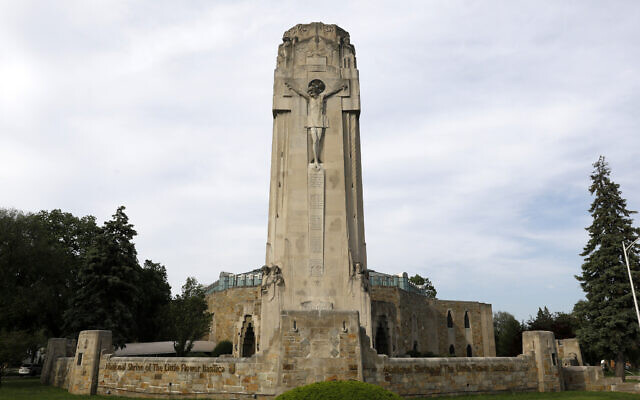
The Shrine of the Little Flower in Royal Oak, Michigan on May 31, 2022. The Shrine was founded by Father Charles Coughlin, who did an anti-Semitic radio show in the 1930s. (Jeff Kowalski / JTA)
So far, that is. On Tuesday evenings, the Shrine hosted an event entitled “The Jewish-Catholic Relations: Past, Present, and Future,” a series of historical lectures co-sponsored by the Archdiocese of Detroit and the local Jewish Community Relations Council, known as the JCRC. Known as /. AJC. Jews and Catholics alike listen to two academics, a Jew and a Catholic, to discuss the history of the relationship between the two religions, much of which revolves around anti-Catholicism.
The place was chosen carefully.
“There is so much polarization in our society, we need this reconciliation in general,” Rabbi Asher Lopatin, executive director of the Detroit JCRC/AJC, told the Jewish Telegraphic Agency. “What is more powerful than the coming together of Jews and Catholics in Father Coughlin’s church?”
As a relatively new arrival in Detroit who lives in Huntington Woods, an overwhelmingly Jewish community that is neighboring Shrine, Lopatin said he felt he had “naively motivated” to mount an event at the church. Is. Truth and Reconciliation Commission Formed in countries such as South Africa and Rwanda after a national shock. Lopatin called the event a “truth and reconciliation” effort between Jews and Catholics – breaking new ground in local relations while acknowledging the painful history of the past.
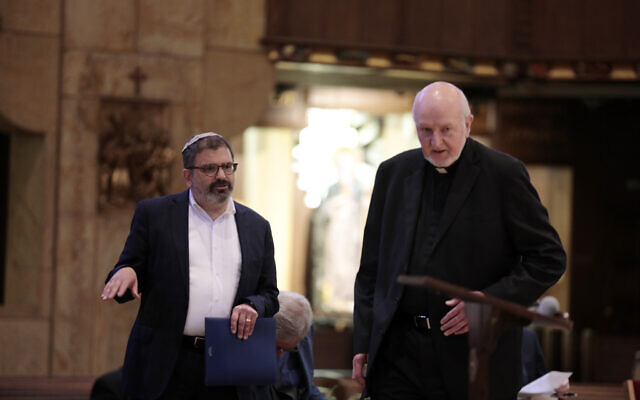
Rabbi Asher Lopatin of the JCRC/AJC talks with Msgr. Patrick Halfpenny at the Shrine of the Little Flower on May 31, 2022 in Royal Oak, Michigan. (Photo by Jeff Kowalski for JTA)
Soon after Lopatin moved to Detroit and became executive director of JCRC/AJC in 2019, the group held the first such event at a church in a different region. Follow-up was delayed due to the COVID-19 pandemic, but there was interest from both sides in hosting an activity at the shrine, which archdiocese staff said had not conducted a Jewish outreach program in three decades – since the church No Publicly apologized for Coughlin’s anti-Semitism in 1992, (According to a local rabbi, the church hosted an event for a now-defunct interfaith group in the late 1990s.)
“Father Coughlin was a force to be reckoned with in the 1930s. Building that space was an achievement,” David Conrad, coordinator of interreligious relations at the archdiocese, told the JTA. And to involve the Pope in Rome to shut down his views and his antisemitism, then it is a stain on our history. This is an unavoidable fact. And it has to be recognized.”
The pairing of organizations on top of Tuesday’s event made for an interesting historical wrinkle: the Detroit JCRC/AJC was originally founded in 1937 as the Jewish Community Council of Metropolitan Detroit, and its first orders of business. was one of for publicly opposing Coughlin’s broadcast as anti-Semitic, Meanwhile, the Archdiocese of Detroit supported and patronized Coughlin for the first decade of his broadcast career until 1937, when the death of the area’s bishop, coupled with Coughlin’s increasingly bad press, prompted the Vatican to appoint a new bishop, Ed Mooney. Led, who worked more aggressively to control the radio priest’s rhetoric.
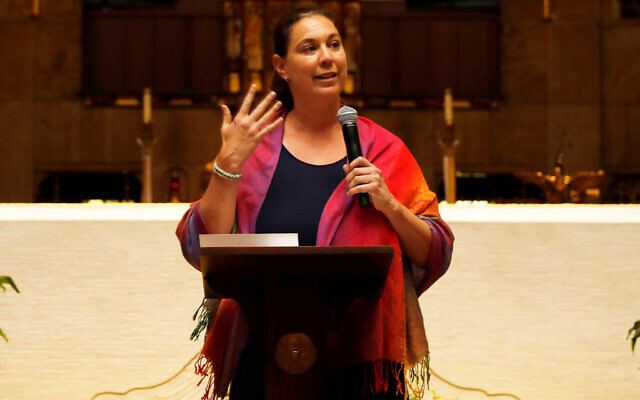
‘Discussion of Jewish-Catholic Relations’ held at the Shrine of the Little Flower in Royal Oak, Michigan on May 31, 2022. (Photo by Jeff Kowalski for JTA)
Coughlin’s name was rarely mentioned during the program, although Robert Fastigi, a historian at the Sacred Heart Major Seminary in Detroit, began his talk from the priest’s old podium, saying, “Father Coughlin was anti-Semitic.” He said that before walking through the history of Jewish-Catholic relations, anti-Semitic elements remain in the Church today, which climaxed with Pope Paul VI’s 1965 reading of Nostra Etate, the Pope’s declaration that Jews should Jesus was not blamed for the death of Christ. ,
But during the Q&A segment, Jewish attendee Levi Smith, vice president of a foundation dedicated to the legacy of Detroit Jewish architect Albert Kahn, paid attention to the site’s history.
“Speaking on behalf of myself and on behalf of many others in our community, we are in awe as we walk past the Shrine,” Smith said. “Because of Father Coughlin.”
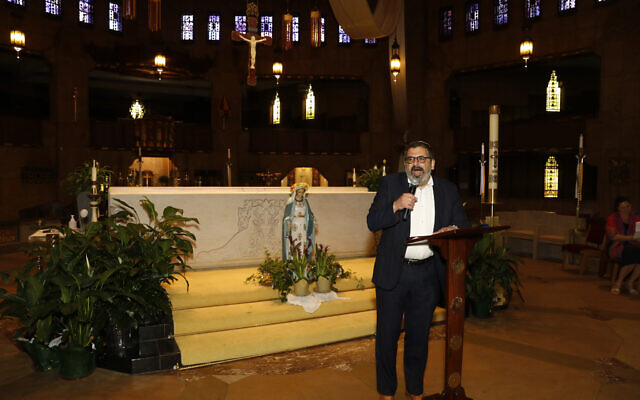
Rabbi Asher Lopatin of the JCRC/AJC at the Shrine of the Little Flower in Royal Oak, Michigan on May 31, 2022. (Photo by Jeff Kowalski for JTA)
He asked whether there were plans to change the words on the plaque and website of the Shrine to more accurately reflect Coughlin’s true nature, and offered to be part of any discussion on the subject: “Let’s sit down, talk.” and come with some improvements.”
After the lecture ended, attendees were invited to take a guided tour of the church, which will mark its centennial in 2026. He was also invited to a dessert reception, which was concocted by the church’s Monsieur Patrick Halfpenny. (The Shrine’s current rector, Rev. Joseph Horn, suffered a heart attack in January and has since been recovering. He was not present at Tuesday’s event.)
As some of the Jews in attendance followed the tour guide, a shrine parishioner named Bob Irwin approached Smith to explain that the church had a committee to reexamine its history, and that of Coughlin, its 100 In anticipation of the anniversary.
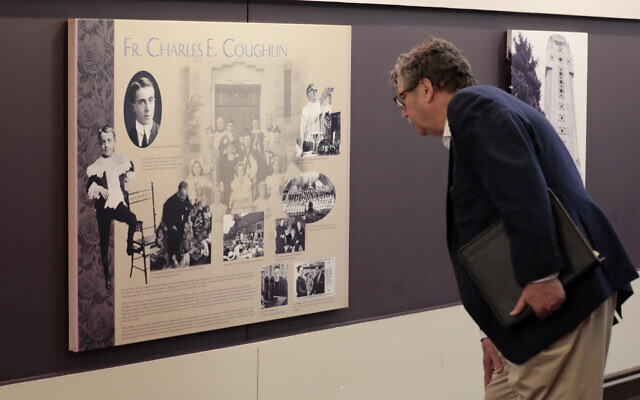
Levi Smith looks at a plaque for Father Charles Coughlin in the lobby of the Shrine of the Little Flower on May 31, 2022 in Royal Oak, Michigan, before ‘Discussion of Jewish-Catholic Relations’. The event was co-sponsored by the Detroit JCRC/AJC and the Archdiocese of Detroit. The Shrine was founded by Father Coughlin, who did an anti-Semitic radio show in the 1930s. (Photo by Jeff Kowalski for JTA)
Irwin said the committee had already rewritten the plaques and was awaiting approval to mount them. The new history will more openly accept Coughlin’s anti-Semitism and discuss efforts by the Church to assert its identity in Coughlin’s later years. Would Smith like to be a part of it?
Smith looked at the interior of the church, with its high, arched roofs and mounted artifacts of an anti-Semitism who once preached to the world.
“Lord,” he said, “brought us together.”